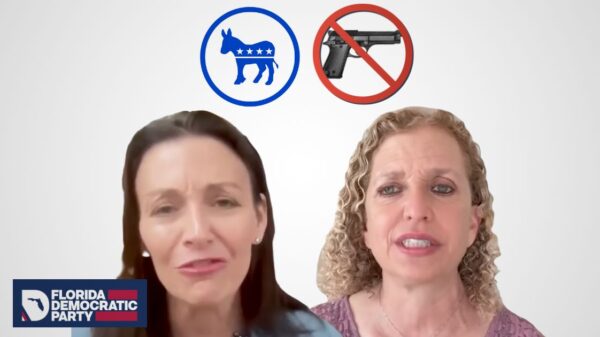Two members of the Florida delegation led efforts to prevent the U.S. Department of Veterans Affairs (VA) from experimenting on dogs which continue to pay off with a new federal appropriations bill ending funds for those projects.
At the start of last year, U.S. Rep. Brian Mast, R-Fla., who sits on the U.S. House Veterans Affairs Committee and lost both his legs during his service in Afghanistan, teamed up with U.S. Rep. Dina Titus, D-Nev., to unveil the “Preventing Unkind and Painful Procedures and Experiments on Respected Species (PUPPERS) Act” which “will put an end to the Department of Veterans Affairs’ practice of performing painful and distressing experiments on dogs, including drilling into dogs’ skulls, inducing heart attacks, and collapsing their lungs.”
Mast had a key ally in Lara Trump who helped ensure last year’s appropriations bills included a proposal phasing out animal testing at the VA.
“I am proud to see that there is real progress being made to close the chapter on VA dog testing. Thanks to President Trump just signing historic, bipartisan legislation to restrict VA dog testing and phase out all unnecessary VA dog and cat experiments by 2025, there is great opportunity afoot to protect veterans’ health all while encouraging the VA to allocate funds and resources towards important programs that will truly benefit our veterans,” said Lara Trump before praising Mast and cosponsor U.S. Rep. Matt Gaetz, R-Fla. “I’m encouraged by the advocacy of lawmakers like Congressmen Brian Mast and Matt Gaetz, for leading on this issue and in particular introducing the PUPPERS Act to end this program.”
“It’s unacceptable for the Department of Veterans Affairs to use taxpayer dollars to fund cruel, unnecessary experiments on animals at the VA. These painful – often deadly – tests have gone on long enough, and it’s about time we worked together to defund them for good. Protecting cats and dogs is common sense, and I’m glad we were able to come together to get this done,” Mast said after the appropriations bills were signed last year.
Back in February 2019, Mast weighed in on why he had introduced the proposal.
“While I was recovering from my injuries, I saw firsthand the important role that dogs play in helping veterans recover from war’s physical and psychological tolls,” Mast said. “For too long, the VA has gotten away with conducting these harmful—sometimes fatal—experiments on dogs. These tests are abusive, waste taxpayer dollars and must be stopped.”
“It’s time to end dog testing at the VA once and for all,” Titus said. “There are proven alternatives to this unnecessary testing that inflicts severe pain on puppies and dogs while producing no discernible medical advances. I’m grateful for the support of Congressman Mast and the many animal welfare and veterans’ organizations that are helping advance this legislation to put an end to this barbaric practice.”
The bill “prohibits the Department of Veterans Affairs from purchasing, breeding, transporting, housing, feeding, maintaining, disposing of or experimenting on dogs as part of the conduct of any study that causes significant pain or distress.”
Mast and Titus reeled in the support of a number of different groups including AMVETS, American Military Retirees Association, DisabledVeterans.org, American Humane Society and the White Coat Waste Project.
Mast and other members of Congress wrote the VA on the matter back in August 2018. In September 2018, VA Sec. Robert Wilkie noted there were almost 10 experiments continuing which former VA Sec. David Shulkin approved before Trump fired him in March 2018.
“VA only conducts such research when absolutely necessary and already makes every effort to reduce it, when possible,” the VA informed Florida Daily. “VA will continue conducting research with animals, as it is absolutely necessary to better treat life-threatening health conditions in our veterans. In fact, research with animals in Cleveland involving researchers from the U.S. Department of Veterans Affairs (VA) recently led to the development of a device that allows Veterans with spinal cord injuries to cough on their own and communicate with a stronger voice, leading to increased independence and significantly reducing respiratory infections and deaths. This important advancement would not have been possible using computer simulations, test tube techniques, ‘organ on a chip’ technology or smaller animal species.
“VA has very few animal studies active at any one time, but some problems like this one can be addressed only with animal research, underscoring the importance of this kind of research in helping veterans who have been severely injured on the battlefield,” the VA added. “This latest medical breakthrough is another addition to 30 important VA canine studies that have benefited veterans.”
This week, the U.S. House Military Construction and Veterans Affairs Appropriations Subcommittee, chaired by U.S. Rep. Debbie Wasserman Schultz, D-Fla., voted to cut funding for VA dog tests which more than 50 members of the House advocated for.
Justin Goodman, the vice president of advocacy and public policy at White Coat Waste Project, weighed in on the matter this week.
“Congress has just made clear that taxpayers should not be forced to foot the bill for heart attack tests on puppies and other wasteful, cruel and secretive VA dog tests that are opposed by veterans, scientists and a majority of other Americans. Thanks to our lobbying and grassroots efforts, and outstanding leadership from Chairwoman Debbie Wasserman Schultz and PUPPERS Act co-leads Reps. Dina Titus and Brian Mast, the VA’s use of dogs in painful experiments is now at its lowest point in recent memory. Hopefully, this bipartisan legislation cutting tax dollars for VA’s dog testing will be the final nail in the coffin of this repugnant and wasteful program,” Goodman said.
“I’ve long said that painful dog testing at the Department of Veterans Affairs is cruel and unnecessary. There are several high-quality, innovative alternatives available to conduct this research. I’m proud that the Appropriations Committee passed the proposal I wrote with Army veteran Rep. Brian Mast to eliminate taxpayer funding for this horrendous practice by the VA,” Titus said this week.
“These painful experiments on dogs are cruel and an unnecessary waste of taxpayer dollars. We’ve worked hard to put a stop to them, and this is another great milestone in our fight. It’s 2020, and there should be no more dog testing by the federal government, period,” Mast said.
Reach Kevin Derby at kevin.derby@floridadaily.com.




















